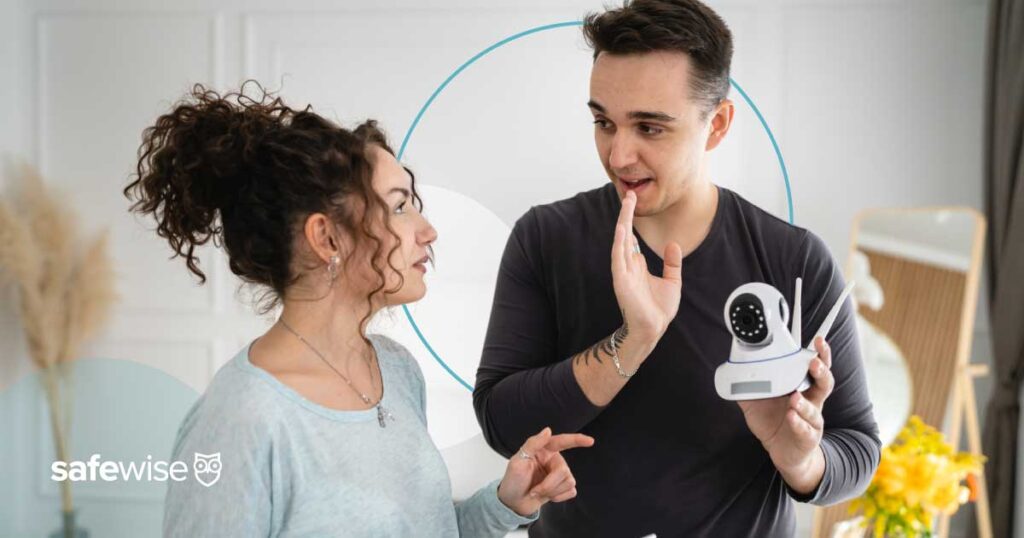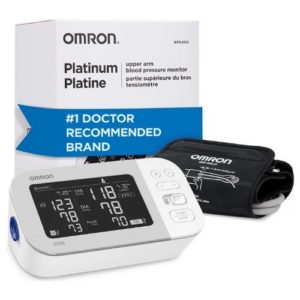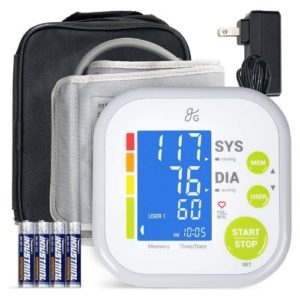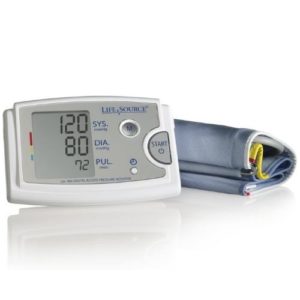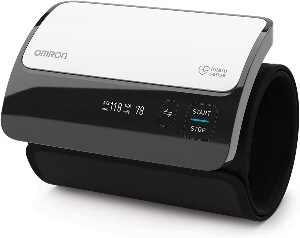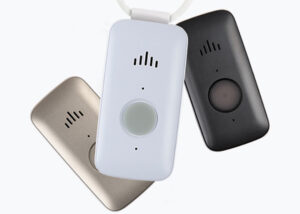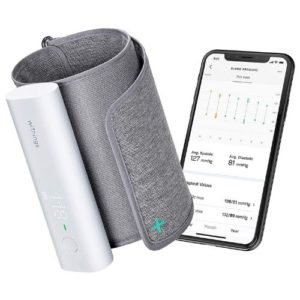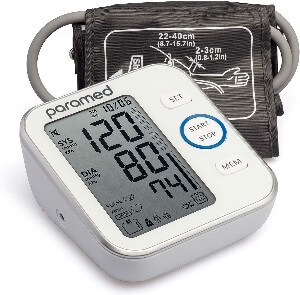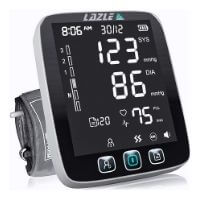Reviewed by health expert Sally Russell, MN, CMSRN, CNE
2024 Best Blood Pressure Monitors Buyers Guide
SafeWise experts have years of firsthand experience testing the products we recommend. Learn how we test and review.
If you're one of the 116 million Americans with high blood pressure or hypertension, twice-daily blood pressure readings can clue you in to trends over time—data that could help you prevent complications like a heart attack or stroke.1,2
To make sure we recommended a sensitive, accurate, and easy-to-use blood pressure monitor, we educated ourselves about blood pressure measurement technology, read hundreds of user reviews across the web, and talked with our very own nurse advisor, Sally Russell, MN, CMSRN, CNE. Our verdict: the best, most accurate blood pressure monitor of 2024is the Omron Platinum.
Like all of the blood pressure monitors on our list, the Omron Platinum is clinically accurate and offers easy-to-understand results. But its stand-out feature is unlimited storage through a mobile app. Other monitors store around 100 readings, which makes it less convenient for you to track long-term trends.
Find other blood pressure monitors with expanded cuff sizes or lower price points in our full list below.
Top 4 best blood pressure monitors
- : Best overall
- : Best for budgets
- : Best cuff size options
- : Most portable

Compare the best blood pressure monitors
*Amazon.com list price as of post date. Offers and availability may vary by location and are subject to change. Read full disclaimer

Our expert advisor, Sally Russell, MN, CMSRN, CNE steered us toward the best brand-name blood pressure monitors she often encounters as a nurse. She also clued us into the most important features to look for in home-use blood pressure monitors, like large, easy-to-use screens.
Low blood pressure puts you at increased risk of fainting and falling.3 Be prepared with a fall detection pendant like the Medical Guardian Mini Guardian. Read our Medical Guardian review for more details.
Blood pressure monitor reviews
1. Omron Platinum: Most accurate blood pressure monitor
The Omron Platinum packs accuracy and storage into one powerful device. This blood pressure monitor comes with TruRead technology for clinically accurate results, and its mobile app can store unlimited pressure readings from an equally endless number of users.
Clinically accurate
The Omron Platinum Bluetooth blood pressure monitor is also very accurate because it uses advanced averaging and TruRead technology. Advanced averaging gives an average result of your last three consecutive tests for more consistent results. TrueRead takes advanced averaging a step further by performing all three pressure readings during the same session. It’s not as fast as a regular test but helps provide precise results.

Stores 200 readings
This Omron model can record up to 200 readings for two users (100 each). Once that space is full, it erases the oldest record. If you measure your blood pressure multiple times per day, you may get just a month's worth of history out of it.
Useful Alexa skill
Yep, we thought the same thing: "Why would I want an Alexa-compatible blood pressure monitor?" It turns out that Alexa's pretty good at math, and you can ask her many questions about your blood pressure after buying a compatible BPM from Omron (like the Platinum) enabling the free Omron Health skill.
Here are just a few things you can ask:
- "Alexa, what was my blood pressure average this month?"
- "Alexa, compare this month's blood pressure readings to last month's readings."
- "Alexa, how many blood pressure readings were stage one this month?"
- "Alexa, what are the guidelines for taking a blood pressure reading?"
Don't have an Alexa-enabled smart hub? Check out our guide to all things Amazon Alexa to get started.
If you want a cheaper unit from Omron, check out the Omron Silver, one of the highest-rated blood pressure monitors on the market. It isn’t as accurate as the Omron Platinum, but it has a more comfortable cuff and still uses advanced averaging.
2. Greater Goods BP Monitor: Best for budgets
The Greater Goods BP Monitor is accurate, versatile, and easy to use. We especially like its large, backlit display that’s easier to read than the screens on most other blood pressure monitors. The only real downside is low memory storage compared to other monitors on the market.
While it's not the cheapest option, the Greater Goods BPM offers the best balance of affordability, accuracy, and user-friendliness.
Accessible display
The large LCD screen makes this home blood pressure monitor incredibly user-friendly. The numbers and buttons are big, so you won’t need glasses to see your results. Most online customers rave about the Greater Goods Blood Pressure Monitor's accuracy, so you can trust that the results will greatly assist your doctor in managing your blood pressure.
Smaller cuff and fewer storage slots than other monitors
It has a comfortable cuff that’s easy to put on and fits on most arm sizes (8.75–16.5 inches). This blood pressure machine also comes with a handy carrying bag that holds the monitor and its accessories. This is ideal for tossing in your bag for a doctor's appointment or packing before a road trip.
There’s not much memory storage, so you won’t be able to keep an in-depth log. This Greater Goods blood pressure monitor holds no more than 60 records each for two users. Still, we think this is the best blood pressure monitor for most folks.
The Greater Goods Bluetooth BP Monitor has all of the original BP monitor’s features but also comes with a Bluetooth connection. This means you can track your readings with a smartphone. It costs about $20 more than the non-Bluetooth edition.
3. Life Source: Best cuff size options
*Amazon.com list price as of post date. Read full disclaimer.
The Life Source blood pressure monitor by A&D Medical stands out because its cuffs come in various sizes to fit all kinds of folks. If you have a big arm and struggle to squeeze yourself into tiny little cuffs, you’ll appreciate the size of Life Source (Extra Large Cuff). Finding the right cuff size makes a big difference in accurately gauging your blood pressure levels.
You want to be able to get a finger between the cuff without feeling like the finger is going numb, but not have it so loose that you didn't have to work at all to get the finger in that space.
When cuffs are too tight it often gives a higher-than-actual blood pressure because it constricts the blood vessels. If the cuffs are too loose, the blood pressure will be lower than it actually is as we aren't really hearing the sounds adequately.
—Sally Russell, MN, CMSRN, CNE

Improved accuracy for larger arms
We like the Life Source extra-large cuff because it fits arms (16.5–23.6 inches) that are too big for every other BP monitor on our list (about 9.0–16.5 inches). This is great for people with particularly muscular builds because they don’t have to settle for less accurate readings from a wrist blood pressure monitor or finger-type blood pressure monitor.
Stores fewer readings than other BPMs
One big miss on this blood pressure monitor is the memory storage. It stores only up to 60 readings, which is average compared to other monitors on the market. While this is acceptable on cheaper devices, it’s not great on a single-user device that costs over $100.
Ultimately, we think this is an excellent option if your arm circumference is smaller or larger than average.
If you have thin arms, check out the Life Source (Small Cuff). The cuff on this BP monitor fits smaller arms (6.3–9.4 inches).
4. Omron Evolv: Most portable blood pressure monitor
The Omron Evolv is for all the busy-bees out there who want a compact, portable, and wireless blood pressure monitor. It comes from the same company as our top-rated pick but has a sleek, all-in-one, battery-powered design. Take it with you anywhere so you never miss those twice-daily readings.
No on-device storage
The Omron Evolv connects to a smartphone app via Bluetooth and instantly records each reading on the app. There's no way to store readings on the device itself.
The other major flaw with the Omron Evolv is that there's no way to charge the battery. It uses four AAA batteries, and while you could get rechargeable AAA batteries, it would be nice if the Evolv could be placed on a charger like every other modern wireless device.
Others we considered
5. Withings BPM Connect: Honorable mention
The Withings BPM Connect is comparable to the Omron Evolv in that it's a portable blood pressure monitor. This one actually stores a few readings (up to eight) on the device itself, whereas the Evolv stores zero.
If you have other health-monitoring products in the Withings ecosystem, this blood pressure monitor is an ideal choice. Otherwise, you can save some money by choosing the Omron Evolv.
The Withings BPM Connect has a futuristic display on the side of the unit that might be hard for some folks to read. We suggest relying on the mobile app or choosing another brand if you have vision problems.
6. Paramed: Best for audio confirmation
The Paramed Blood Pressure Monitor has a large digital display that is easy to read. It also stores up to 120 readings. If you have more than one person that needs to save readings, it will save two profiles for two different users.
You can also switch between AC power and battery power.
The Paramed BPM's stand-out feature is voice confirmation. The device will audibly tell you whether you have high, low, or normal blood pressure.
7. Lazle JPD-HA101: Nurse recommended
Lazle blood pressure monitors come highly recommended by our own expert advisor, Sally Russell, as well as her other nursing colleagues. “Lazle came up in my conversations with other healthcare providers," she told us.
"The two people who had patients who had gotten these lately had lots of good things to say about them,” she said. Customers especially likedits large, easy-to-read display that date stamps readings, leaving you with fewer numbers to commit to memory.
Incorrect usage alerts
This Lazle blood pressure monitor also alerts users when they put the cuff on incorrectly, so you’ll avoid incorrect readings. It stores readings for two people, and the adjustable cuff helps ensure a good fit for both users. Plus, the Lazle fits more arms than any other BPM on our list (8-17 inches).
How to use a blood pressure monitor
Take an accurate in-home blood pressure reading using digital blood pressure monitors by following the steps below:
- Get ready. Make sure you’re comfortable and relaxed. Your bladder should be empty, as a full one can impact the reading. Avoid smoking, exercise, and caffeine before taking your blood pressure.
- Sit down. A comfortable sitting position is also the best position for taking a blood pressure reading. Remove any tight or bulky clothing around the upper arm or roll up your sleeve. Place both feet on the floor (no crossed legs!) and rest your forearm comfortably on a table at heart level. Place your arm with the palm of your hand facing up.
- Find your pulse. Locate the brachial artery by finding your pulse in the center of your elbow. Press your index and middle fingers lightly against the inside of your elbow. If you can’t find it by feeling, use the upper arm cuff to locate your pulse.
- Use the right size of cuff. For an accurate reading, you need a blood pressure arm cuff that fits correctly. The length of the cuff should equal at least 80% of the circumference of your upper arm.
- Apply the blood pressure cuff. Wrap the cuff around your upper arm (it might help to have someone assist you). The lower edge of the cuff should be about one inch above the pit of your elbow. The arm cuff should feel snug, but not tight. If your blood pressure cuff has an arrow on it, make sure it points to the bend of your arm.
- Power up the monitor. Press the power button on your automatic blood pressure monitor to turn it on. You should see all the display symbols flash on the screen, followed by a zero. The zero means that the monitor is ready for action.
- Inflate the cuff. Press the start button if your digital monitor has automatic cuff inflation. For manual inflation, close the air valve and pump the bulb rapidly until the pressure gauge reads at least 160. (We recommend devices with automatic inflation, because they're much easier to use.)
- Get your readings. Watch the monitor for the pressure readings. They will display on either the left or right side of the screen. You’ll hear a long beep, which means the blood pressure measurement is complete. Take note of the pressures on the display.
- Systolic blood pressure should be on the left or the top of the screen.
- Diastolic pressure should be on the right side of the screen or just below the systolic blood pressure reading.
- The monitor may also display your pulse rate.
- Many monitors also track if there’s an irregular heartbeat, which may indicate undiagnosed health issues.
- Finally, allow the cuff to deflate completely before taking it off. If you used a manual inflation device, open the air valve to release pressure in the cuff.
That's why using automatic blood pressure monitors is best if you're not used to taking blood pressure or can't squeeze the bulb enough to get it adequately inflated.
—Sally Russell, MN, CMSRN, CNE

The Centers for Disease Control (CDC) state that Systolic Pressure is the blood pressure in your vessels when your heart beats. Diastolic Pressure measures the blood pressure in your blood vessels between heartbeats.
What to do if your reading is inaccurate
Sometimes you’ll get a BP measurement that just doesn’t make sense. This is fairly common, especially when you’re new to home blood pressure monitoring.
If you didn’t get an accurate reading, don’t immediately re-inflate the blood pressure cuff. Remove it and give yourself at least one minute before reapplying it and repeating the steps to measure your blood pressure.
The American Heart Association recommends taking your new home blood pressure monitor with you to your next doctor’s appointment.4 You can ask questions, and your doctor can ensure you use the monitor correctly.
You can also verify that your home monitor gets the same results as the equipment in your doctor’s office. It’s good practice to bring in your home monitor at least once a year to make sure readings are still accurate.
There are five levels of blood pressure according to the American Heart Association:
- Normal
- Elevated
- High Blood Pressure (Hypertension) Stage 1
- High Blood Pressure (Hypertension) Stage 2
- Hypertensive Crisis
Remember, according to the Mayo Clinic, home monitoring your blood pressure isn't a substitute for visiting a medical professional.
Consistent blood pressure monitoring is key
Staying on top of your blood pressure is important, but it doesn’t have to be difficult. With the right home blood pressure monitor, it’s easy to keep your health in check.
By partnering with your doctor to keep an ongoing record of your blood pressure between appointments, you’re more likely to get the right recommendations and medications.
Final Word
We recommend the Omron Platinum automatic home blood pressure monitor thanks to its clinical accuracy and advanced features:
- Works for unlimited users when paired with the Omron app
- Stores up to 100 readings per user
- Has an adjustable cuff
- Can be battery-powered or plugged into the wall
Using a blood pressure monitor is just one way to improve your health and live a safer, more active life. Find more ways to care for your wellness and keep your household safe with our extensive safety resources, covering everything from medical alert devices to carbon monoxide detectors.
Blood pressure monitor FAQ
There are three methods for measuring blood pressure:
- Upper Arm Monitors are the only type recommended by the American Heart Association (and therefore the only ones on our best-of list) because they’re the most accurate.5 The cuff wraps around the upper part of your arm and tightens to measure your blood pressure.
- Wrist Monitors wrap around your wrist to measure your blood pressure. Wrist blood pressure monitors aren’t considered as accurate as upper arm monitors unless you have your arm and wrist positioned exactly at heart level. You must follow the manual very closely because there’s a lot of room for error. Wrist monitors are easy to travel with and can be more comfortable than upper arm monitors.
- Finger Monitors are very similar to wrist monitors. They’re small, easy to travel with, and more comfortable than an upper arm monitor. Again, the main shortcoming is that it’s not the most accurate.
That said, you should pick the best type for your needs that also meets your doctor’s recommendations.
"The body has to adjust from a lying-down position to push blood against gravity up to the brain. So when the pressure is low, it takes more effort to increase blood flow to the brain," explains our health advisor Sally Russell, MN, CMSRN, CNE.
"When you quickly sit up or stand up and you have low blood pressure, the brain isn't getting enough oxygen. This makes you faint."
Read more about how to prevent falls.
You can usually use a Health Savings Account (HSA) or Flexible Spending Account (FSA) to pay for blood pressure monitors without paying a sales tax.
While many used blood pressure monitors are available, it’s a good idea to buy a new one. The accuracy and reliability of your blood pressure monitor can determine your hypertension care course and may save your life. You want to make sure your machine works correctly.
To check how accurate your monitor is, you can take it to your doctor’s office and see how it compares with their results.
Not all blood pressure monitors are the same. Like any instrument, there are slight differences between the different models. Calibrating your blood pressure monitor involves taking it to your doctor’s office to verify that the readings match those in their office.
The DASH diet (and others like it) are great choices for managing your blood pressure, especially under the supervision of your doctor. But they don’t replace the need for a blood pressure monitor because you still need to take accurate and frequent readings to see if the diet works.
In general, wrist monitors aren’t as accurate as upper arm cuffs. Some patients prefer to use a wrist cuff because it’s easier to use with one hand.
All of the upper arm cuffs we recommend are easy to put on and use with one hand.
Most blood pressure monitors have a one-size-fits-most cuff for upper arms measuring 9.0–16.5 inches. Getting a blood pressure cuff that fits right is critical for accurate readings.
If your upper arm measures more than 16.5 inches around, you should get a bigger cuff. You can usually purchase extra cuffs separately, and most are compatible with various blood pressure machines. Just make sure your tubing is the correct size to connect with your monitor.
My doctor told me I have high blood pressure. Can I use my Fitbit or smartwatch to monitor my blood pressure?
While Fitbits and smartwatches are great for tracking general fitness data, like steps taken and pulse rate, they aren’t accurate or reliable enough for monitoring high blood pressure. In fact, most heart monitors for exercise only track your heart rate. They simply can’t take the correct measurements.
The only proper way to take your blood pressure involves sitting down for at least a few minutes with both feet flat on the floor and your arm resting at heart level. For more recommendations for proper use, see the American Heart Association’s recommendations for monitoring your blood pressure.
While Fitbits and smartwatches are great for tracking general fitness data, like steps taken and pulse rate, they aren’t accurate or reliable enough for monitoring high blood pressure. In fact, most heart monitors for exercise only track your heart rate. They simply can’t take the correct measurements.
The only proper way to take your blood pressure is to sit down for at least a few minutes with both feet flat on the floor and your arm resting at heart level. For more recommendations on proper use, see the American Heart Association’s recommendations for monitoring your blood pressure.
Normal blood pressure readings fall between 90 and 120 systolic pressure and between 60 and 80 diastolic pressure.2
If either number is out of range, talk to your doctor—even if the second number is normal. If you don't feel well, get immediate medical attention.
How we reviewed blood pressure monitors
We started our evaluation by reviewing prices, user reviews, and doctor recommendations. Here are some things we considered when selecting blood pressure monitors for our list:
- Simple interface: A user-friendly interface with large numbers and big buttons makes it easier to navigate the blood pressure monitor and understand the results.
- Multiple users: A multiple-user feature tracks more than one person’s blood pressure, so you can share the monitor with family members and skip the hassle of buying multiple devices.
- Accurate readings: Accuracy is one of the most important things to look for in a blood pressure monitor. We chose only upper arm monitors for our list because they tend to be the most accurate. Learn more about the different types of blood pressure monitors.
- Memory storage: With high memory storage, you can log your blood pressure readings multiple times a day and over a long period to give your doctor a better picture of your health.
- Advisor recommendations: We asked Sally Russell, MN, CMSRN, CNE, health expert, and educator, to review our selection and suggest one of her own.
Learn about how we rank products by checking out our full methodology.
Related articles on SafeWise
Sources
- Centers for Disease Control and Prevention, "Facts About Hypertension," October 2022. Accessed November 9, 2023.
- Leslie Thomas, M.D., Mayo Clinic, "High Blood Pressure (Hypertension)," September 2022. Accessed November 9, 2023.
- Mayo Clinic, "Low Blood Pressure (Hypotension)," May 2022. Accessed November 9, 2023.
- American Heart Association, “Monitoring Your Blood Pressure at Home,” November 2017. Accessed November 9, 2023.
- National Institute on Aging, "High Blood Pressure and Older Adults," October 2022. Accessed November 9, 2023.
Disclaimers
Product prices and availability are accurate as of the date/time indicated and are subject to change. Any price and availability information displayed on Amazon at the time of purchase will apply to the purchase of this product. Safewise.com utilizes paid Amazon links.
Certain content that appears on this site comes from Amazon. This content is provided “as is” and is subject to change or removal at any time.
Recent Articles

